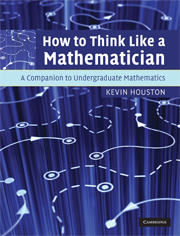Book contents
- Frontmatter
- Contents
- Preface
- I Study skills for mathematicians
- II How to think logically
- III Definitions, theorems and proofs
- IV Techniques of proof
- V Mathematics that all good mathematicians need
- 27 Divisors
- 28 The Euclidean Algorithm
- 29 Modular arithmetic
- 30 Injective, surjective, bijective – and a bit about infinity
- 31 Equivalence relations
- VI Closing remarks
- Appendices
- Index
27 - Divisors
from V - Mathematics that all good mathematicians need
- Frontmatter
- Contents
- Preface
- I Study skills for mathematicians
- II How to think logically
- III Definitions, theorems and proofs
- IV Techniques of proof
- V Mathematics that all good mathematicians need
- 27 Divisors
- 28 The Euclidean Algorithm
- 29 Modular arithmetic
- 30 Injective, surjective, bijective – and a bit about infinity
- 31 Equivalence relations
- VI Closing remarks
- Appendices
- Index
Summary
You know my methods. Apply them.
Sherlock Holmes in Arthur Conan Doyle, The Hound of the BaskervillesThe set of integer numbers is among the simplest objects in mathematics. These numbers have a whole theory devoted to them, called, not surprisingly, number theory. In this chapter we will consider a small part of this theory. The aim is to provide you with mathematics that you will often need but, more importantly, we will apply the earlier methods to see how they illuminate the material.
Divisibility
What basic properties do numbers have? What can I do with them? Well, I can add and subtract then, multiply and divide, take to the power just to name a few. The best set of numbers to begin playing with is the integers, denoted ℤ. Adding any two integers produces an integer. Subtracting any integer from another produces an integer. Multiplying any two integers produces an integer. Dividing any integer by another produces an integer… sometimes. This means we have found an interesting property concerning division of integers. Being mathematicians we produce a definition to isolate this idea and start to investigate it.
- Type
- Chapter
- Information
- How to Think Like a MathematicianA Companion to Undergraduate Mathematics, pp. 187 - 195Publisher: Cambridge University PressPrint publication year: 2009



